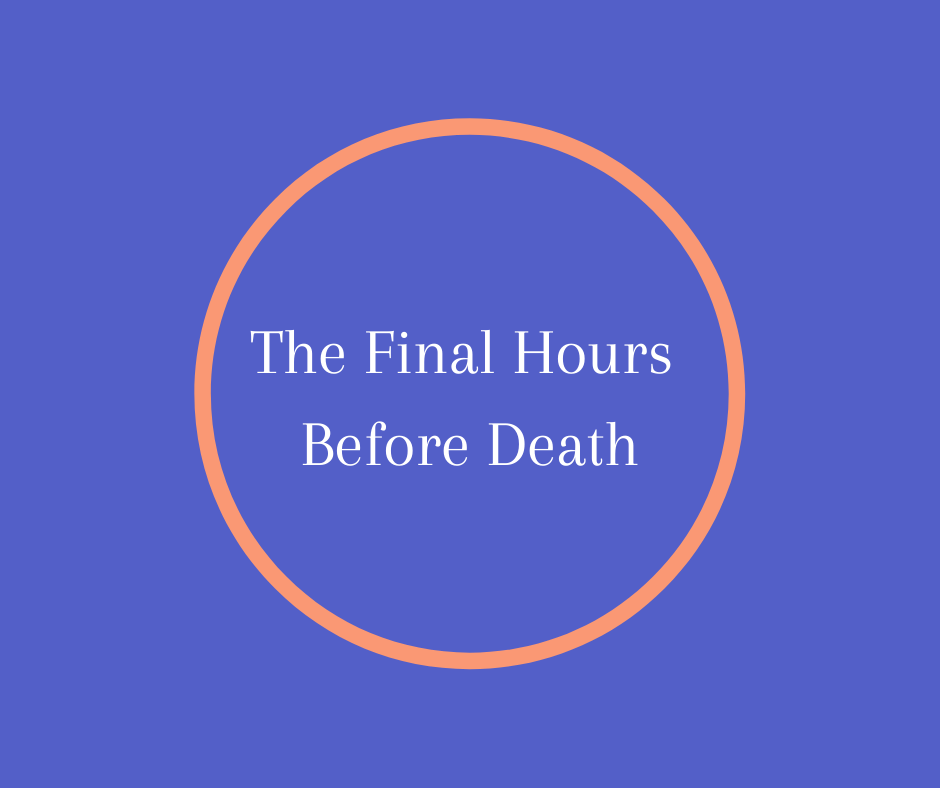I have noticed concern by medical workers as to what to do during the hours to minutes before death. Here are some ideas to consider. When the patient is hours to minutes before death they may be experiencing some or all of the following things. Not responding to the environment, mottled, breathing irregular, maybe breathing like a fish, slight agitation, murmuring words but not making sense. Family and significant others are gathered in anticipation of death occurring soon. What do we as professionals do to assist the family in having a positive experience?
* Consider yourself a Conductor. Your job is to be as invisible as possible
yet get everyone working together and feeling supported.
* Fear is what most in the room are experiencing. Fear of the unknown,
fear of pain, fear of what they are seeing, fear of what they think will
happen. Reassure family that what is happening is normal and natural. It
is your job to assure them nothing bad is happening, to neutralize the fear
everyone has brought to this experience.
* Knowledge reduces fear. Begin gently explaining what is happening.
“Mom is doing a good job. She is doing what she is supposed to be
doing”. Go over each thing Mom is doing and explain simply what is
happening (don’t use medical terminology, speak at a 5th grade level) and
that it is all normal. “Her breathing is 10 times a minute and her blood
Pressure is 60/40. This tells me her body is slowing down.” “This is how
you die, and she is doing just what she is supposed to be doing’”
* Explain what is going to happen next. “Mom will start breathing like a fish
breaths. Her breaths will get slower and slower until she stops, then she
may take a couple of long spaced out breaths.”
* Encourage the family and significant others to individually talk to the
person who is dying. To spend some quiet time and share their thoughts
and their goodbyes. Reassure the family that the person can hear.
* Tell the family they can lay on the bed, hold their loved one, talk to them,
cry with them.
* Music played softly is often comforting to everyone present. I would pick
music that the patient enjoyed during their life. It doesn't have to be
classical, hymns, or harps.
* This is not a medical event. You are not doing medical interventions
unless:
1. The patient’s restlessness is a danger to themselves.
2. Their congestion is excessive and positioning is not effective. Don’t
use suction but you can use a Scopolamine Patch.
(It probably won’t help, but if its causing the family distress you can try.)
3. If pain has been a part of the disease process, then continue giving
pain medication until death. If pain has not been a part of the disease
process then there is no need to give a narcotic just because the person is
approaching death. Dying itself is not painful, disease causes pain.
4. If respirations are severely labored due to the disease process,
then you can use small amounts of morphine. Remember as death
approaches congestion and labored breathing are normal.
* This is a challenging time for medical professionals. We are used to
fixing, to doing something. Now we are not fixing or doing. When I have
taken a person’s blood pressure for the third time and it is 60/40 that tells
me I am nervous and wanting to do something. You don’t need to know
what the blood pressure is once you have taken it the first time. You know
death is approaching and all the tools we were taught to rely on in health
care no longer apply. Education, support, and guidance are the tools we
now bring to the room.
* If labor (those hours before death) becomes long I would encourage the
family to share stories, look at scrapbooks, and reminisce while in the
room. Have a normal, natural family gathering.
* Explain that we have some control over the time that we die. If you are
with someone when they die you are there because they want you there.
If you are not, even while you tried to be, then know you were given a gift
of love and protection.
* Because we can hear and have limited control over the time that we die
we need to gently tell the person who is dying what is going on in the
room. Who is entering, who is leaving. “It is 12:00 and I am going to bed
now. I will be back in the morning. I love you. If you need to leave before I
return I understand.”
When someone is dying a gradual death from disease and is hours to
minutes from death they don't need a doctor, nurse, social worker, or even
a chaplain. They need someone who understands the normal, natural dying
process and can gently guide and support the family to help create a
sacred memory from this very sacred experience.
Something more about The Final Hours Before Death...
My book, The Eleventh Hour, details more specifically how to conduct a vigil before someone's death. It is quite helpful not only for the caregivers but the family of the dying as well.








49 comments